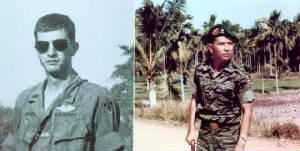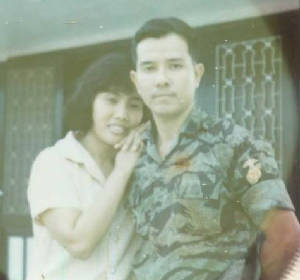|
Di An - 1968

The Vietnam War, 30
years after.
Story
by Linda Leavitt, Editor
The Scarsdale Enquirer
We drove slowly down a street of tidy
Spanish-style houses in San Jose, looking for the
one that belonged to Nguyen Minh Chau. It was April, 1998, 23 years almost to the day after the fall of Saigon. My husband wondered if he'd recognize the Vietnamese district chief he last saw 30 years
ago in a war-torn country on the other side of the world.
As an army intelligence officer and advisor to the South
Vietnamese Army, Liam worked directly with Chau and other Vietnamese officials in the village of Di An in Bien Hoa Province. He found it somewhat absurd that a 26-year-old college graduate with
one year of military training should advise anybody on anything, but intelligence had sounded more interesting and less dangerous
than the infantry, and like most young single American men, Liam had little choice. It was 1966 and caps and gowns were quickly
replaced by army boots and rifles. In the year he spent in Vietnam, Liam learned to appreciate the strange beauty of the jungle, tolerate extreme heat, live with fear and become accustomed
to death. He also found a good friend in Chau, a brave and honest man who loved his country and was determined to save it
from communism, a man profoundly grateful for our support, however ambivalent Americans were at home. Liam had often told
me about his affection and regard for Chau and wondered what became of him. One day in 1998, browsing in a book store in Stamford, he came across a war memoir written by the army advisor who replaced him in Di An. With mounting excitement, he
turned the pages to see photos of his living quarters and the village he remembered so well, and, best of all, of his old
comrade-in-arms. Nguyen Minh Chau, he learned, had received a silver star after being wounded a fourth time and had escaped
to California a few years after the fall of Saigon in April, 1975.
Liam called the author of the book, Lt. Col. John Cook, in Maryland, who shared his high opinion of the district chief and gave him Chau's telephone number in California. Chau was surprised and delighted to hear from Liam. His family had prospered and multiplied, the lieutenant must come and see for himself.
Mrs. Chau, a pretty woman with a brilliant smile who radiated self-confidence, welcomed us into her home. Chau, a
colonel by the time he left Vietnam, limped to the door on a cane, dragging
his paralyzed right side, the result of wounds he'd suffered before Liam met him, later compounded by a bullet in his lung
and two grueling years in a North Vietnamese prison camp.
Despite their love for their patriarch, we never saw anyone
in the family help Chau get around, as if that would compromise
his dignified self-reliance. The only time we saw his disability acknowledged was when his grandchild, a roly-poly tot with
spiky hair, imitated - to everyone's amusement - the way his grandpa walked.
Liam and Chau called each other by the
names they'd used 30 years ago: "Dai Uy" ("Captain") and "Trung Uy" ("Lieutenant"). Ba Dai Uy ("Mrs. Captain") called Liam
simply "Murphy."
In the corner of the living room was a Buddhist shrine, and on the walls ample testimony to the achievement
of the American Dream - six wedding photos and six graduation photos. Five of the six Chau children had married Vietnamese
and all had graduated from
college. Each had lived at home while in college, Mrs. Chau explained, to save money so that the next could go. Now they were
all Silicon Valley engineers.
After a difficult time
at first, Chau had gone to work for a refugee resettlement organization and had his own immigration consultant business. Mrs.
Chau is a medical translator at Santa
Clara Valley
Medical Center.
We talked as Mrs. Chau prepared
spring rolls, and served us salty dried shrimp with nuoc nam (fish sauce) and a kind of Vietnamese bouillabaisse. Chau poured
cognac after cognac reminiscing about the old days and Liam struggled manfully to keep up.
After dinner, the Chaus'
sons and daughters came over with their spouses and children, as they do every Saturday night. One son recalled riding on
Liam's motorcycle when he was about 4 years old and Mrs. Chau chastised Liam all over again for giving her such a scare.
The Escape from Vietnam
The sons-in-law had fascinating tales of escape from Vietnam; one, whose father was a diplomat, had been on the last flight out before Saigon fell; another had stolen a police boat and escaped to Thailand and eventually the Philippines. But most spellbinding of all was Mrs. Chau's account of how she spirited
her husband out of a hospital where she feared his enemies would find and kill him, moved him from one hiding place to another
for nearly a year while they tried to arrange his escape to Thailand. Chau had been an extremely effective router of communists; now that they had won the war, there was little chance
they would forgive and forget. Finally, in 1978 Chau escaped by boat to Thailand.
With her husband safe, Mrs. Chau could focus her considerable
wits on getting the rest of the family out of the country.
First,
after months of watching and making discrete inquiries to figure out whom she could trust, she bought a fishing boat, but
did not take possession of it. She carefully studied the routines of the fishermen and the police and gradually rounded up
smaller vessels to accommodate the increasing number of family members and close friends
who wanted to leave Vietnam. The refugees would make their way from
their inland homes down the river to the harbor in groups of six or seven so as not to arouse suspicion. Ultimately the group
numbered 27 adults and 35 children, including six Chaus.
Being married to an army officer had taught Mrs. Chau a few
things about strategy: Each person was only told the number of his or her group, and where their boat was hidden and when
they were to start their journey down the river. That way if one group was caught, they couldn't give any information on the
plans of the others.
Finally in December, 1979, she was ready. The refugees brought nothing with them except food.
Of the expedition's dozen boats, only one was stopped and its occupants questioned before being allowed to continue on down
the river, ostensibly to go to market. Before daybreak, the small boats made their way to the fishing boat in the harbor and
everyone quickly climbed aboard. The previous owner's instructions were succinct: Follow the long end of a constellation shaped
like a cross and it will take you to Thailand.
The first night at sea, high winds rose and the boat began to toss and pitch. Everyone
was violently sick. The children clung to Mrs. Chau saying they wanted to be near their mother when they died. She was the
only one who wasn't sick, so she didn't dare rest.
In the middle of the night the engine sputtered and died.
They
were adrift. All they could do was hope that the wind was taking them farther and farther away from Vietnam. But when dawn came, Mrs. Chau's heart sank. Emerging
from the morning mist was the familiar silhouette of an island right outside the harbor they had left 24 hours earlier.
Some
of the others wanted to give up then, but Mrs. Chau was firm. "We have no choice," she said. "We cannot go back. We must keep
going." Finally her nephew, the only person on the board with any mechanical training, got the engine going again.
For
three days and nights they followed the cross in the sky, accompanied by two whales, which Mrs. Chau interpreted as a good
omen. Finally they saw land. When they got within shouting distance of a beach, they called out in English and found out they
had made it to Thailand. But they could not land - Thailand was not accepting any more boat people. " I have 35
children aboard," Mrs. Chau protested. "They are sick and hungry we have been traveling for three days!" Sorry, the answer
came back. No more boat people.
The refugees followed the coast, wondering how far it was to Malaysia. The engine quit again. A coast guard patrol boat approached the foundering vessel and
told them where they were, in fact, off the coast of Malaysia, and the country was allowing boat people to land on its shores. But rescues at sea were forbidden.
If they could get into the beach on their own power they were saved. Otherwise . . .
It was tantalizing to see their
goal so near. The nephew tried frantically to repair the engine while the wind blew the boat farther and farther out to sea
and Mrs. Chau prayed to Buddha.
Buddha answered. The wind changed and blew the boat toward shore. Sick, exhausted
and relieved, the refugees carried their children through the surf and collapsed on the beach until they gained the strength
to walk several miles to the nearest refugee camp. A Red Cross official loaned Mrs. Chau money to call her husband in Monterey.
Their new life as Americans was about to begin.
Hearing
about their arduous path to the good life, Liam and I were impressed anew with the opportunities intelligent and industrious
immigrants find here, no matter how little they had when they arrived on our shores. But it was also abundantly clear that
Chaus' survival and success were based on a devotion to family that we native-born Americans, with our emphasis on individual fulfillment, tend to undervalue.
Eventually,
we believe, democracy will replace communism in Vietnam as it has almost everywhere in the world. The real tragedy is that when the time comes to make the transition, the
country will not have the courage and the vision of the Chaus to make it work.
Vietnam's loss was America's gain.
1974

|

